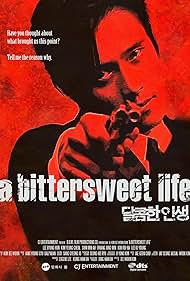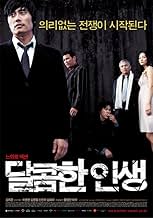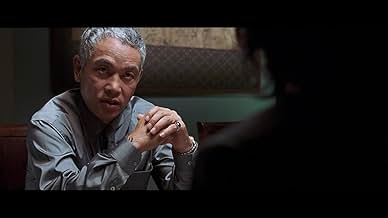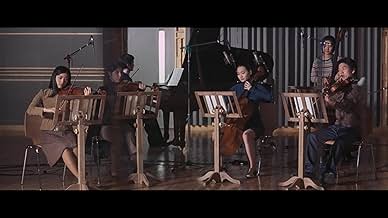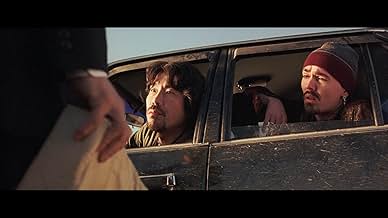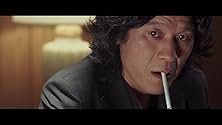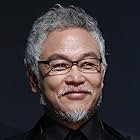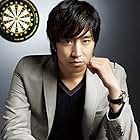Les choses tournent mal pour un caïd lorsqu'il ne suit pas les ordres de son patron.Les choses tournent mal pour un caïd lorsqu'il ne suit pas les ordres de son patron.Les choses tournent mal pour un caïd lorsqu'il ne suit pas les ordres de son patron.
- Prix
- 8 victoires et 14 nominations au total
Kim Yeong-cheol
- Mr. Kang
- (as Kim Young-chul)
Kim Hae-gon
- Weapon smuggler
- (as Hae-gon Kim)
Eric Moon
- Gun Dealer's Brother
- (as Eric)
Avis en vedette
Overall a good film and while it plays with the action and drama, the film has massive potential to be so much more. As my title suggests the film is essentially two different films, which begins brightly before fading fast. The first half effortlessly introduces our protagonist and the majority of the cast effortlessly. While stereotypes are put into play they all show something a little different and the plot at it's quietest plays out quite well and to a high standard expected of korean cinema. Yet as Sun Woo's life begins to break down after a costly mistake, the quality and drama quickly takes a backseat to the all too familiar genre of action and revenge. Yet it is disappointing how a country full of great examples and almost infamously associated with the revenge genre can fail so easily. As with many action films it weaves a lot of style at the expense of logic and only gets worse exponentially as guns are introduced and you have a stylish action film which could've been born out of western cinema that lacks the story telling quality it started with. Muddled with a untidy conclusion the film would've been better if the last hour was taken out and the last few minutes kept in
For director Kim Jee-woon, humor is a basic element of films. And he says no matter how dark and moody it may seem, his new film ''A Bittersweet Life (Talkomhan Insaeng)¡¯¡¯ is no exception.
''This movie basically deals with relationship breakups resulting from small communication breakdowns,¡¯¡¯ Kim said during a news conference Monday after the preview screening of ''A Bittersweet Life.¡¯¡¯ Without calling it comedy exactly, sometimes audiences have to laugh at very serious or ironic situations, Kim said.
Kim has shown his unique morbid sense of humor in previous movies such as ''The Quiet Family,¡¯¡¯ a black comedy about a family who kill visitors to their cottage, ''The Foul King,¡¯¡¯ a comic drama about an amateur wrestler, and one horror contribution work for the omnibus film ''Three.¡¯¡¯ Kim is also behind ''A Tale of Two Sisters,¡¯¡¯ the psychological horror film that became a summer hit in 2003.
''A Bittersweet Life,¡¯¡¯ starring Lee Byung-hun from ''Everybody Has a Little Secret¡¯¡¯ and Shin Mina from ''Madeleine,¡¯¡¯ portrays the desperate and brutal revenge of Sun-woo (played by Lee) after he is expelled from his gang and comes close to being killed by his boss.
Lee Byung-hun is a hit-man who falls for the girlfriend of his boss in the stylishly violent ¡°A Bittersweet Life.¡± Conventional ideas of causation are put into doubt in director Kim Jee-woon's twist on film noire. ''A Bittersweet Life (Talkomhan Insaeng)'' is what Korean critics are describing as ''Action Noire.'' In it, he tweaks the traditional Korean gangster story line, presenting a work with film noire undertones and stylish cinematography.
Sun-woo (Lee Byung-hun) is a revenging dark angel dressed in black. Gang leader Kang (Kim Young-cheol) assigns Sun-woo, his right-hand man, to watch after his nubile girlfriend/professional cellist Hee-soo (Shin Mina) while he is away and find out about the other guy with whom he suspects she is messing around.
The plot is complicated by Sun-woo's existential decision to stray from the explicit instructions with which he is charged. He is cryptically told time and again to make good on a promise, but he never exactly know what that is.
Much of the action occurs in the long shadows the sprawling megapolis Seoul casts. Here, the gangsters wish they were too cool to be killed. No friend can really be trusted as the good guys are not so good and the bad guys can be down right evil. Importantly, the motivation of his tormentors is shrouded in mystery.
But the movie has been labeled ''action noire'' for a good reason. The stylistic ultra-violence of director Kim is superb. The creepy fisherman killer represents a unique Korean twist on the classic film noire villain. Our hero is not a good, good guy either, and I loved that about him. He is not only tough, but also a stone-face killer _ a tribute to both the director and actor's character interpretation.
After all, gangsters should fight to kill, and that means sometimes going for the knees and other joints, hitting low and dirty to take the guy out quick. In general, the fight scenes were creative. Watch for the face-dragged-across-the-cinderblock-wall scene, perhaps a first for cinematic violence.
''This movie basically deals with relationship breakups resulting from small communication breakdowns,¡¯¡¯ Kim said during a news conference Monday after the preview screening of ''A Bittersweet Life.¡¯¡¯ Without calling it comedy exactly, sometimes audiences have to laugh at very serious or ironic situations, Kim said.
Kim has shown his unique morbid sense of humor in previous movies such as ''The Quiet Family,¡¯¡¯ a black comedy about a family who kill visitors to their cottage, ''The Foul King,¡¯¡¯ a comic drama about an amateur wrestler, and one horror contribution work for the omnibus film ''Three.¡¯¡¯ Kim is also behind ''A Tale of Two Sisters,¡¯¡¯ the psychological horror film that became a summer hit in 2003.
''A Bittersweet Life,¡¯¡¯ starring Lee Byung-hun from ''Everybody Has a Little Secret¡¯¡¯ and Shin Mina from ''Madeleine,¡¯¡¯ portrays the desperate and brutal revenge of Sun-woo (played by Lee) after he is expelled from his gang and comes close to being killed by his boss.
Lee Byung-hun is a hit-man who falls for the girlfriend of his boss in the stylishly violent ¡°A Bittersweet Life.¡± Conventional ideas of causation are put into doubt in director Kim Jee-woon's twist on film noire. ''A Bittersweet Life (Talkomhan Insaeng)'' is what Korean critics are describing as ''Action Noire.'' In it, he tweaks the traditional Korean gangster story line, presenting a work with film noire undertones and stylish cinematography.
Sun-woo (Lee Byung-hun) is a revenging dark angel dressed in black. Gang leader Kang (Kim Young-cheol) assigns Sun-woo, his right-hand man, to watch after his nubile girlfriend/professional cellist Hee-soo (Shin Mina) while he is away and find out about the other guy with whom he suspects she is messing around.
The plot is complicated by Sun-woo's existential decision to stray from the explicit instructions with which he is charged. He is cryptically told time and again to make good on a promise, but he never exactly know what that is.
Much of the action occurs in the long shadows the sprawling megapolis Seoul casts. Here, the gangsters wish they were too cool to be killed. No friend can really be trusted as the good guys are not so good and the bad guys can be down right evil. Importantly, the motivation of his tormentors is shrouded in mystery.
But the movie has been labeled ''action noire'' for a good reason. The stylistic ultra-violence of director Kim is superb. The creepy fisherman killer represents a unique Korean twist on the classic film noire villain. Our hero is not a good, good guy either, and I loved that about him. He is not only tough, but also a stone-face killer _ a tribute to both the director and actor's character interpretation.
After all, gangsters should fight to kill, and that means sometimes going for the knees and other joints, hitting low and dirty to take the guy out quick. In general, the fight scenes were creative. Watch for the face-dragged-across-the-cinderblock-wall scene, perhaps a first for cinematic violence.
I could sit here and start this review off any number of ways to make this film sound ultra important. I could say, once in a great while a film comes along, blah, blah. Or, Only a select few films ever have reached this, blah, blah. Or I could say, if you see one movie this year, blah, blah. You know the drill. These are the opening sentences the big-boy critics use when they really want you to see a flick and when they want a particular review to really stand out. Well, films that deserve this kind of "special" praise really do only come around once in a great while. Unbelievably, I have seen two in only six months time. The first was what I like to call the first real 21st Century film, and that was Oldboy. And the second film of this status also comes from Korea, believe it or not, and it is Bittersweet Life.
Bittersweet Life is probably one of the most simple, most streamlined modern films I have ever seen. It is lean, mean, and like its lead male, a damn ruthless fighting machine. The film beats along with its Raymond Chandler-like screenplay with all the jazz and style of early 90's John Woo and with the energy and themes of Quentin Tarantino's grind house 70's. Life plays with your emotions, making you care for the bad-guy hero even though he is a vicious killer, and causes one to release tension through laughter when the blood starts gushing like a dozen ruptured fire hoses. Wholesale death, blood by the gallons, broken bones and multiple beatings with humongous pipe-wrenches, two-by-fours, and lead pipes are on order, right after a heaping dish of innocent love and a guy trying for once to do the right thing.
The plot, well you see, it's like this: you can see everything coming a mile away, the movie plays it straight, and follows the exact path you know it will and the exact path you hope it will. There are no twist endings, no complicated triple crosses, no hidden motives for the characters. Everything on screen happens the way you see it, and everything thing ends exactly the way you picture it. And this is a good thing. The film is so on track that it doesn't need a twist or a swerve to make you pay attention. It starts at A, ends at E, and hits B, C and D on the way there. Life is so steeped in its genre tropes of noir character and themes that the ending is know to all of us before it even starts. However, it's the journey that matters, and I'll be damned if you can find a better-looking, more brutally violent journey anywhere.
As much as I try to analyze the film, nothing comes to mind. And this is the purest of all compliments. The film is as shallow as the pools of blood splattered in the hallways, alleyways and run down exteriors of the sets. Often times a director feels the need to bog a simple story down with twists, and a deeper meaning to hide the fact that they are afraid to just let things happen because they need to happen. Bittersweet Life is not one of these films. It exists with its soul laid bare for all to see, and when the carnage is complete, you thank the film for being honest with itself. As the final credits roll you might find yourself asking, "Is that it?" Yes, that is itcinematic perfection. It is all it needs to be: pure and simple, boisterous and calm, bloody and drenched in gore and an honest movie with nothing to hide.
--genrebusters
Bittersweet Life is probably one of the most simple, most streamlined modern films I have ever seen. It is lean, mean, and like its lead male, a damn ruthless fighting machine. The film beats along with its Raymond Chandler-like screenplay with all the jazz and style of early 90's John Woo and with the energy and themes of Quentin Tarantino's grind house 70's. Life plays with your emotions, making you care for the bad-guy hero even though he is a vicious killer, and causes one to release tension through laughter when the blood starts gushing like a dozen ruptured fire hoses. Wholesale death, blood by the gallons, broken bones and multiple beatings with humongous pipe-wrenches, two-by-fours, and lead pipes are on order, right after a heaping dish of innocent love and a guy trying for once to do the right thing.
The plot, well you see, it's like this: you can see everything coming a mile away, the movie plays it straight, and follows the exact path you know it will and the exact path you hope it will. There are no twist endings, no complicated triple crosses, no hidden motives for the characters. Everything on screen happens the way you see it, and everything thing ends exactly the way you picture it. And this is a good thing. The film is so on track that it doesn't need a twist or a swerve to make you pay attention. It starts at A, ends at E, and hits B, C and D on the way there. Life is so steeped in its genre tropes of noir character and themes that the ending is know to all of us before it even starts. However, it's the journey that matters, and I'll be damned if you can find a better-looking, more brutally violent journey anywhere.
As much as I try to analyze the film, nothing comes to mind. And this is the purest of all compliments. The film is as shallow as the pools of blood splattered in the hallways, alleyways and run down exteriors of the sets. Often times a director feels the need to bog a simple story down with twists, and a deeper meaning to hide the fact that they are afraid to just let things happen because they need to happen. Bittersweet Life is not one of these films. It exists with its soul laid bare for all to see, and when the carnage is complete, you thank the film for being honest with itself. As the final credits roll you might find yourself asking, "Is that it?" Yes, that is itcinematic perfection. It is all it needs to be: pure and simple, boisterous and calm, bloody and drenched in gore and an honest movie with nothing to hide.
--genrebusters
I had the opportunity to watch this brilliant movie at home, while translating it from English to Greek for the viewers of the Thessaloniki Film Festival in November, 2005.
I was impressed by the stunning performance of the leading actor, as well as of the other actors. The music of the film was also wisely selected.
Some -few- funny moments in the film help the viewer lighten up and get ready for what I saw as brilliantly directed fighting scenes, that neither bored me nor made me look away.
At the end of the film, when the desciple was crying for "a dream that can never come true" I was absolutely sure that what I saw was nothing less than a true work of art.
I was impressed by the stunning performance of the leading actor, as well as of the other actors. The music of the film was also wisely selected.
Some -few- funny moments in the film help the viewer lighten up and get ready for what I saw as brilliantly directed fighting scenes, that neither bored me nor made me look away.
At the end of the film, when the desciple was crying for "a dream that can never come true" I was absolutely sure that what I saw was nothing less than a true work of art.
I had the luck to watch this gem at the Fantasy-Film-Festival in Frankfurt yesterday. It was shown in a theater with about 600 seats and against my expectations the room was packed with people.
In comparison with Oldboy or Sympathy for Mr. Vengeance the story is not as deep and goes more straightforward to the pure revenge theme. But this does not make the movie less enjoyable. The cinematography is brilliant and the main-character delivers a great performance. It contains beautifully choreographed martial-arts and gunfight scenes with references to masterpieces like Taxi Driver and Kill Bill.
Despite the fact it is very harsh in some scenes the humor does not come to short. The scene with a discussion of Korean-Russian wannabe-gangsters made me nearly wet my pants.
In comparison with Oldboy or Sympathy for Mr. Vengeance the story is not as deep and goes more straightforward to the pure revenge theme. But this does not make the movie less enjoyable. The cinematography is brilliant and the main-character delivers a great performance. It contains beautifully choreographed martial-arts and gunfight scenes with references to masterpieces like Taxi Driver and Kill Bill.
Despite the fact it is very harsh in some scenes the humor does not come to short. The scene with a discussion of Korean-Russian wannabe-gangsters made me nearly wet my pants.
Le saviez-vous
- AnecdotesThe Korean title "Dalkomhan Insaeng" and the name of the bar "La Dolce Vita" translate to "The Sweet Life". As an ironic touch the International English title is called "A Bittersweet Life".
- GaffesToward the end of the film, when Kim Sun-woo is walking down the corridor searching for his former boss, a guard sitting and reading a newspaper gets up to stop him. Kim Sun-woo shoots him but his gun is not pointed at the guard. Rather, it is clearly pointed at the wall where fake blood appears after the shot like a paint gun.
- Citations
Sun-woo: One late autumn night, the disciple awoke crying. So the master asked the disciple, "Did you have a nightmare?" "No." "Did you have a sad dream?" "No," said the disciple. "I had a sweet dream." "Then why are you crying so sadly?" The disciple wiped his tears away and quietly answered, "Because the dream I had can't come true."
- Générique farfeluAt the end of the credits, the sign above the bar that says "La Dolce Vita" is seen exploding.
- Autres versionsTwo versions of the film exist, the original theatrical version and the director's cut. The director's cut's edits include slight cutting and re-arrangement of scenes, swapping music placement and some additional scenes that do not appear in the original version of the film.
- ConnexionsReferences La dolce vita (1960)
Meilleurs choix
Connectez-vous pour évaluer et surveiller les recommandations personnalisées
Détails
Box-office
- Brut – à l'échelle mondiale
- 10 080 808 $ US
- Durée1 heure 59 minutes
- Couleur
- Mixage
- Rapport de forme
- 2.35 : 1
Contribuer à cette page
Suggérer une modification ou ajouter du contenu manquant

Lacune principale
By what name was Dalkomhan insaeng (2005) officially released in Canada in French?
Répondre